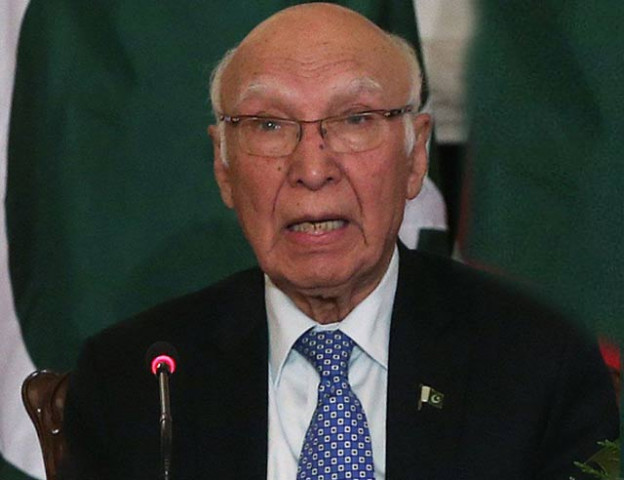Afghan Taliban leadership in Pakistan: Aziz
Admits Islamabad has used this leverage to pressure the group into entering negotiations with Kabul

PHOTO: AFP
Prime Minister’s Adviser on Foreign Affairs Sartaj Aziz has admitted that the Afghan Taliban leadership is in Pakistan and their presence has been used by Islamabad as a ‘leverage’ to pressurise the insurgent group into coming to the negotiating table.
This is the first public acknowledgement by any senior Pakistani official about the Taliban leadership’s presence in the country and is likely to have far reaching implications.
Speaking at the Washington-based Council on Foreign Relations (CFR) think tank, Aziz said Pakistan had ‘some influence’ on the Taliban because their leadership was in Pakistan.

“They (Taliban) get some medical facilities, their families are here. So we can use those levers to pressurise them to say: come to the table,” he said according to the transcript of his address released by CFR on Thursday. In a candid talk, the adviser also revealed how Pakistan brought the Taliban to the negotiating table last July by restricting their movement and denying them some of the facilities they had been enjoying in the country.
“We had to use some of these levers… we restricted their movements and their access to hospital and other facilities, and threatened to expel them at the very least if they did not come forward to talk … because we have hosted [the Taliban leadership] for 35 years and we cannot do that anymore … the whole world is blaming us simply because of their presence here,” he said.
However, the adviser added that Pakistan could not negotiate with the Taliban on behalf of Afghanistan’s government “because we can’t offer them what the Afghan government can.” He made it clear that Pakistan, like China and the US, could only facilitate negotiations.
Published in The Express Tribune, March 4th, 2016.



















COMMENTS
Comments are moderated and generally will be posted if they are on-topic and not abusive.
For more information, please see our Comments FAQ